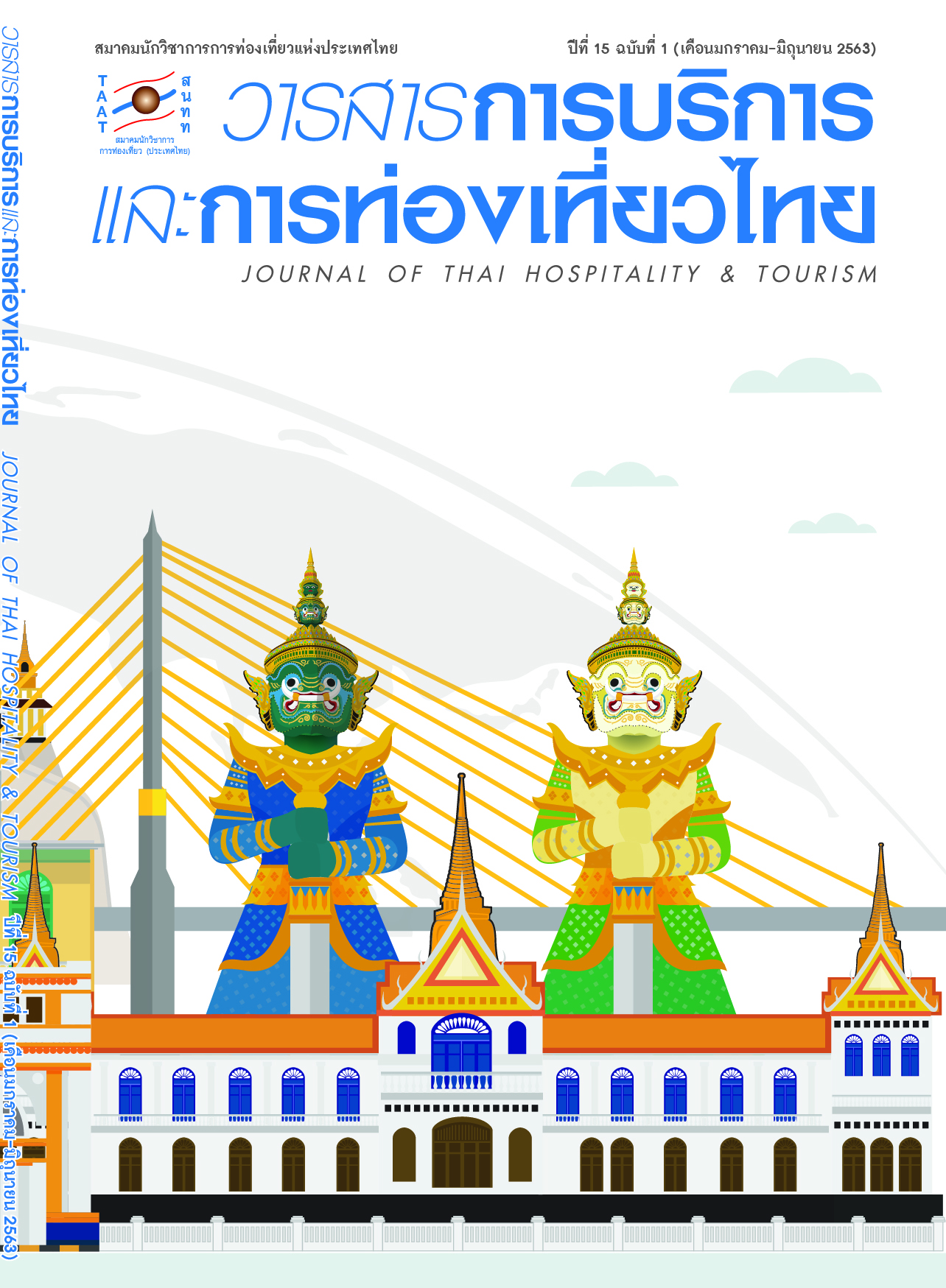การพัฒนาศูนย์ความเป็นเลิศด้านการท่องเที่ยวอย่างยั่งยืนในประเทศไทย
Main Article Content
บทคัดย่อ
การจัดตั้งศูนย์ความเป็นเลิศด้านการท่องเที่ยวอย่างยั่งยืนในประเทศไทย เนื่องจากการท่องเที่ยวถือเป็นแหล่งรายได้หลักที่สำคัญของประเทศไทย โดยวิธีการสนทนากลุ่ม (group discussion) จากผู้เชี่ยวชาญด้านการท่องเที่ยวทั้งภาคปฏิบัติและภาคทฤษฎี 30 คน ผลการศึกษาพบว่า ศูนย์ความเป็นเลิศควรมีโครงสร้างการบริหารที่ชัดเจน มีผู้เชี่ยวชาญด้านการท่องเที่ยว และมีกลไกสนับสนุนการทำงาน สำหรับภารกิจหน้าที่ เพื่อการกำหนดนโยบายการพัฒนาการท่องเที่ยวที่เป็นมิตรกับสิ่งแวดล้อม ส่งเสริมและพัฒนาศักยภาพของอุปทานการท่องเที่ยวเชิงนิเวศของไทย ส่งเสริมและพัฒนา และจัดการอุปสงค์ทางการตลาดการท่องเที่ยวเชิงนิเวศของไทย สร้างและพัฒนากลไกการจัดการการท่องเที่ยวเชิงนิเวศของไทย โดยส่งเสริมการวิจัยเพื่อปรับโครงสร้างการทำงานเชิงเครือข่ายระหว่างกระทรวง หน่วยงาน และองค์กรต่างๆ ที่เกี่ยวข้องในการพัฒนาการท่องเที่ยวเชิงนิเวศของชาติ เพื่อสร้างเครือข่ายการจัดการการท่องเที่ยวเชิงวัฒนธรรมและมรดกโลกในระดับต่างๆแบบ พหุภาคี เพื่อใช้การท่องเที่ยวเป็นเครื่องมือสร้างการเรียนรู้ในการเสริมสร้างความเข้มแข็งให้กับหน่วยงาน องค์กร ชุมชน และภาคีอื่นๆ ที่เกี่ยวข้องในกลุ่มการท่องเที่ยวที่เป็นมิตรกับสิ่งแวดล้อม เพื่อพัฒนาและเสริมสร้างความเข้มแข็งของกลไกการบริหารจัดการการวิจัยการท่องเที่ยวเชิงนิเวศโดยสนับสนุนและส่งเสริมการวิจัยเพื่อต่อยอดกลุ่มการท่องเที่ยวทางทะเลและการท่องเที่ยวเชิงวัฒนธรรมและมรดกโลกและเพื่อกำหนดนโยบายด้านการท่องเที่ยวในการตอบสนองความต้องการเร่งด่วนของพื้นที่และสร้างฐานข้อมูล
Article Details
เอกสารอ้างอิง
Chatchanok Boonchai. (2013). The Study for the Development of Economical Potential from Historical Tourism: Case of Nakhonnayok and Prachinburi Provinces. Suan Dusit Rajabhat University.
Jumnian Junhasobhaga. (2010). A Participatory Community Capacity Reinforcement Model for Sustainable Tourism Development in Lower Central, Thailand. Doctoral Dissertation. Faculty of Arts, Ramkhamhaeng University.
Khunkai Jantadara. (2013). Tourism in Laos: Potential Development of Cultural Tourism Management on the Capital City of Vientiane, People’s Democratic Republic of Laos. Doctoral Dissertation. Faculty of Cultural Science, Mahasarakham University.
Niphon Wuttichai. (2011). Capacity Building and Strengthening Community Based Tourism Case Study of Bangchan Sub–District, Chanthaburi. Rambhai Barni Rajabhat University.
Nongluck Popichit, Jirut Chuanchom & Siriwan Serirat. (2013). A Survey of Destination Potential, Tourism Activities and Future Travelling Intention towards Tourism along the Rivers in Phra Nakhon Si Ayutthaya Province. Suan Dusit Rajabhat University.
Office of the Electronic Transactions Commission. (2013). Electronic Commerce with Tourism Industry. Retrieved May 15, 2016, from http://www.etcommission.go.th/home/article–other–topic–travel–ecommerce.html.
Susaraporn Tangtenglam. (2006). Potential Ecotourism Thai–Vietnam Friendship Village Result to Support Friendship and Promotion Tourism Thai–Vietnam. Master’s Thesis. Faculty of Business Administration, Khonkaen University.
Thairoj Phoungmanee. (2009). Research and Development of Competences of Leader in Chiang–Khan Community into Brand Image Promoting Concerning Arts and Applied Arts for Managing Sustainable Tourism an Chiang–Khan Municipality; Chiang–Khan District; Loei. Loei Rajabhat University.


